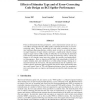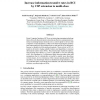1261 search results - page 19 / 253 » Adaptive brain-computer interface |
113
Voted
CHI
2008
ACM
16 years 2 months ago
2008
ACM
Adaptive personalization, where the system adapts the interface to a user's needs, has the potential for significant performance benefits on small screen devices. However, re...
NIPS
2008
15 years 3 months ago
2008
From an information-theoretic perspective, a noisy transmission system such as a visual Brain-Computer Interface (BCI) speller could benefit from the use of errorcorrecting codes....
100
Voted
NIPS
2003
15 years 3 months ago
2003
Brain-Computer Interfaces (BCI) are an interesting emerging technology that is driven by the motivation to develop an effective communication interface translating human intention...
116
click to vote
HCI
2011
14 years 5 months ago
2011
Abstract. Brain computer interfaces (BCI) that use the steady-statevisual-evoked-potential (SSVEP) as neural source, offer two main advantages over other types of BCIs: shorter ca...
143
click to vote
BCSHCI
2008
15 years 3 months ago
2008
Multimodal interfaces have long held the promise of enhanced and effective human machine interaction. The ultimate goal of multimodal interfaces is to facilitate human activity al...


